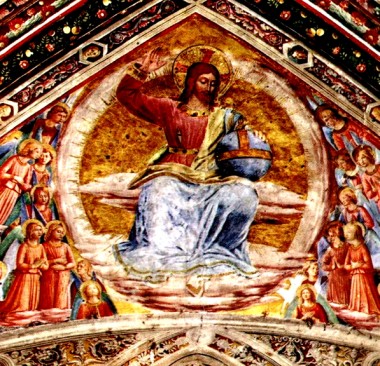ON THE GENERAL JUDGMENT
“The Lord shall be known when he executeth judgment.”
cf Psalm 9:17
At present, there is no one in this world more despised than Jesus Christ. There is more respect shown to a peasant than to the Lord; for we are afraid to insult a peasant, or provoke him to anger, lest he should seek revenge. But insults are offered to God, and are repeated as wantonly as if he could not avenge them whenever he pleases. “The wicked,” says Job, “looked upon the Almighty as if he could do nothing” (cf Job 22:17). Therefore the Redeemer has appointed a day of general judgment, and which is called, in the Scripture, the day of the Lord, on which Jesus Christ will make known the greatness of his majesty. “The Lord shall be known when he executeth judgment (cf Psalm 9:17). Hence that day is called, not a day of mercy and pardon, but “a day of wrath, a day of tribulation and distress, a day of calamity and misery” (Zephaniah 1:15). Yes; for then the Lord shall come to repair the honor which sinners have sought to take from him on this earth. Le us examine the circumstances of the judgment of this great day.
 The coming of the Judge shall be preceded by fire. “A fire shall go before him” (Psalm 97:3). Fire shall descend from heaven, and shall burn the earth and all things upon the earth. “The earth, and the works that are in it, shall be burnt up” (2 Peter 3:10). Thus palaces, churches, villas, cities, kingdoms, all must be reduced to one heap of ashes. This house, defiled by sins, must be purified by fire. Behold the end of all the riches, pomps, and pleasures of this earth! After the death of all men, “the trumpet shall sound, and the dead shall rise again” (1 Corinthians 15:52). “As often,” says Jerome, “as I consider the day of judgment, I tremble; that trumpet appears always to sound in my ears, ‘Arise, ye dead, and come to judgment'” [widely attributed to St. Jerome]. At the sound of this trumpet, the souls of the just shall descend to be united to the bodies with which they served God in this life; and the unhappy souls of the damned shall come up from hell to take possession of the accursed bodies with which they offended God.
The coming of the Judge shall be preceded by fire. “A fire shall go before him” (Psalm 97:3). Fire shall descend from heaven, and shall burn the earth and all things upon the earth. “The earth, and the works that are in it, shall be burnt up” (2 Peter 3:10). Thus palaces, churches, villas, cities, kingdoms, all must be reduced to one heap of ashes. This house, defiled by sins, must be purified by fire. Behold the end of all the riches, pomps, and pleasures of this earth! After the death of all men, “the trumpet shall sound, and the dead shall rise again” (1 Corinthians 15:52). “As often,” says Jerome, “as I consider the day of judgment, I tremble; that trumpet appears always to sound in my ears, ‘Arise, ye dead, and come to judgment'” [widely attributed to St. Jerome]. At the sound of this trumpet, the souls of the just shall descend to be united to the bodies with which they served God in this life; and the unhappy souls of the damned shall come up from hell to take possession of the accursed bodies with which they offended God.
O, how great shall be the difference between the bodies of the just and the bodies of the damned! The just shall appear whiter, more beautiful, and more resplendent than the sun. “Then the just shall shine as the sun” (Matthew 13:43). Happy he who knows how to mortify his flesh in this life by refusing it forbidden pleasures; and who, to keep it under greater check, imitates the saints, by denying it even lawful gratifications, and by treating it with severity and contempt. O, how great shall then be the happiness of those who shall have practiced mortification of the flesh! We may estimate it from the words which St. Peter of Alcántara addressed after death to St. Teresa, “O happy penance, which merited for such great glory!” But, on the other hand, the bodies of the reprobate shall appear black and hideous, and shall send forth an intolerable stench. O how great the pain of the damned in taking possession of their bodies! “Accursed body!” the soul shall say, “to indulge you, I have brought myself to perdition.” And, the body shall say, “Accursed soul! Why have you, who had the use of reason, allowed me the pleasures which have merited for you and me the eternal torments of hell?”
Affections and Prayers
Ah, my Jesus and my Redeemer, who shall be one day my Judge, pardon me before that day arrives. “Turn not away thy face from me” (Psalm 27:9). Thou art now a Father to me; and, like a father, receive into thy friendship a son who casts himself with sorrow at thy feet. My Father, I ask pardon. I have offended thee: I have unjustly forsaken thee. Thou didst not deserve such treatment from me. I repent of it; I am sorry for it with my whole heart. “Turn not away thy face from me.” Do not cast me off, as I deserved. Remember the blood which thou hast shed for me, and have pity on me. My Jesus, I wish for no other judge than thee. “I willingly,” said St. Thomas of Villanova, “submit to the judgment of him who died for me, and who, that he might not condemn me, has condemned himself to the cross.” St. Paul has said the same. “Who is he that shall condemn? Christ Jesus, that died” (Romans 8:34). My Father, I love thee, and, for the future, I will never more depart from thy feet. Forget the injuries I have done thee, and give me a great love for thy goodness. I desire to love thee more than I have offended thee; but, if thou dost not assist me, I shall not be able to love thee. Assist me, O my Jesus; make me always grateful to thy love, that, on the day of judgment, I may be found in the valley of Josaphat, among the number of thy lovers. O Mary, my queen and my advocate, assist me now; for if I am lost, thou shalt not be able to help me on that day. Thou prayest for all; pray also for one who glories in being thy devoted servant, and who places so much confidence in thee.
Editor’s Note: This meditation is from St. Alphonsus Liguori’s “Preparation for Death” (1758).
Art: Christ the Judge, Fra Angelico, 1447, PD-US, Wikimedia Commons.




